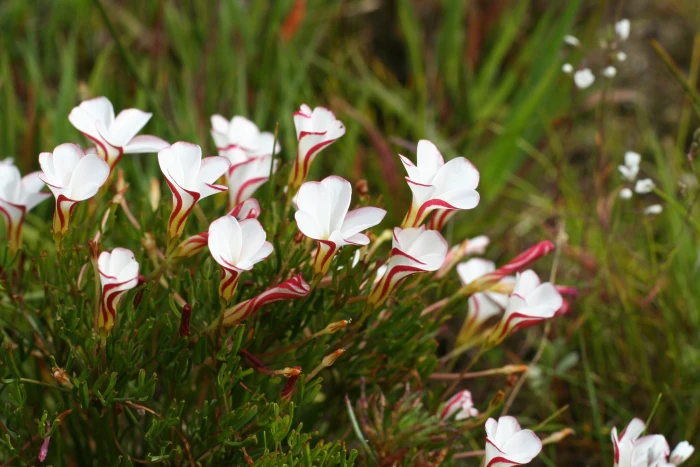Candy Cane Sorrel
(Oxalis versicolor)
Candy Cane Sorrel (Oxalis versicolor)
/
/

Paul Hoekman
Public Domain
Image By:
Paul Hoekman
Recorded By:
Copyright:
Public Domain
Copyright Notice:
Photo by: Paul Hoekman | License Type: Public Domain | License URL: http://creativecommons.org/publicdomain/zero/1.0/ | Rights Holder: Paul Hoekman | Publisher: iNaturalist | Date Created: 2018-08-19T13:03:01-07:00 |
























Estimated Native Range
Climate Requirements
| • Precipitation | 8" - 61" |
| • High Temp. | 72°F - 91°F |
| • Low Temp. | 17°F - 50°F |
Summary
Oxalis versicolor, commonly known as Candy Cane Sorrel, is a deciduous or semi-deciduous perennial bulb hailing from the Cape Floristic Region in Southwestern South Africa. It reaches a modest height of 8–15 cm (3.1–5.9 in) and forms a mound of fresh green, trifoliate leaves. The plant is particularly noted for its distinctive flowers, which appear in late summer and autumn. These blooms feature narrow white tubular buds with a curved scarlet edging on each petal, resembling the stripes of a candy cane. The flowers are particularly showy when they open in full sunlight, though they remain furled under overcast conditions or in shade. The striking appearance of its blooms has earned Oxalis versicolor the Royal Horticultural Society’s Award of Garden Merit.
Candy Cane Sorrel is valued for its unique, ornamental flowers and its ability to add a splash of color to rock gardens, borders, and containers. It is also suitable for underplanting beneath deciduous trees and shrubs. In the United States, it can grow up to 12 inches tall and is hardy in USDA zones 7 - 9. For optimal growth, it prefers full sun to partial shade and requires well-drained soil. While it needs regular watering, it is important to avoid waterlogged conditions. When not in bloom, its foliage provides a lush, green backdrop. Potential problems include susceptibility to rust and root rot if overwatered. Care should be taken in some regions as it can become invasive if conditions are favorable.CC BY-SA 4.0
Candy Cane Sorrel is valued for its unique, ornamental flowers and its ability to add a splash of color to rock gardens, borders, and containers. It is also suitable for underplanting beneath deciduous trees and shrubs. In the United States, it can grow up to 12 inches tall and is hardy in USDA zones 7 - 9. For optimal growth, it prefers full sun to partial shade and requires well-drained soil. While it needs regular watering, it is important to avoid waterlogged conditions. When not in bloom, its foliage provides a lush, green backdrop. Potential problems include susceptibility to rust and root rot if overwatered. Care should be taken in some regions as it can become invasive if conditions are favorable.CC BY-SA 4.0
Plant Description
- Plant Type: Bulb
- Height: 0.2-0.5 feet
- Width: 0.3-0.3 feet
- Growth Rate: Moderate
- Flower Color: Red, White
- Flowering Season: Summer, Fall
- Leaf Retention: Deciduous
Growth Requirements
- Sun: Full Sun, Part Shade
- Water: Medium
- Drainage: Slow, Medium, Fast
Common Uses
Bee Garden, Bird Garden, Butterfly Garden, Deer Resistant, Drought Tolerant, Edible*Disclaimer: Easyscape's listed plant edibility is for informational use. Always verify the safety and proper identification of any plant before consumption., Groundcover, Low Maintenance, Rock Garden, Showy Flowers
Natural Habitat
Cape Floristic Region in Southwestern South Africa
Other Names
Common Names: Candy Cane Oxalis, Peppermint Rock Oxalis
Scientific Names: Oxalis versicolor, Oxalis versicolor var. versicolor, Oxalis glabra, Oxalis tenuifolia, Oxalis elongata, Oxalis punctulata, Acetosella versicolor, Oxalis sylvestris
GBIF Accepted Name: Oxalis versicolor L.